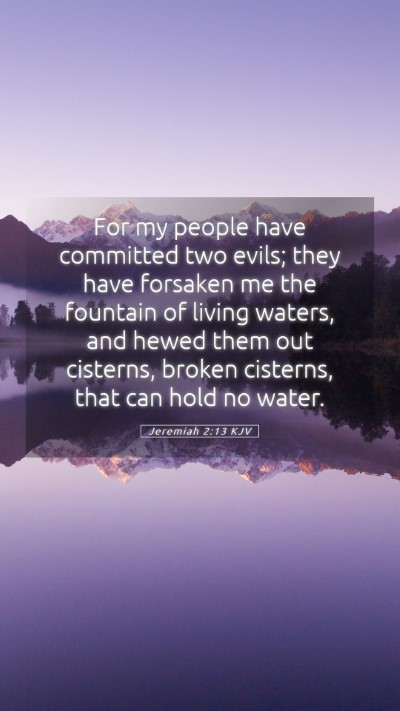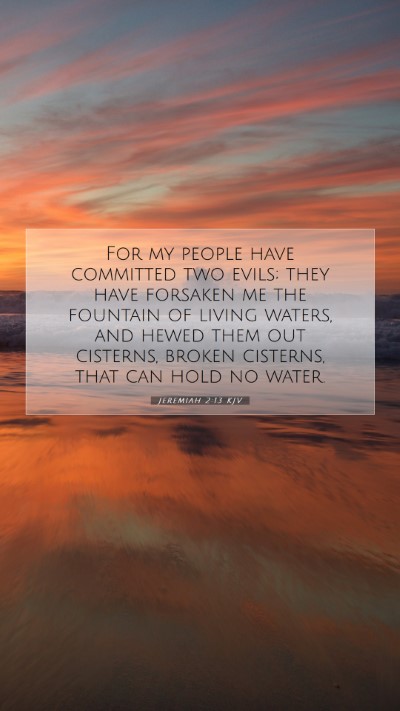Jeremiah 2:13 - Bible Verse Meaning and Explanation
The verse Jeremiah 2:13 states: "For my people have committed two evils; they have forsaken me, the fountain of living waters, and hewed them out cisterns, broken cisterns, that can hold no water." This verse highlights significant themes of spiritual abandonment, dependence, and idolatry, making it a rich topic for Bible verse interpretations and Bible verse commentary.
Understanding the Verse
This verse depicts God lamenting over His people's unfaithfulness. They have forsaken Him, the ultimate source of sustenance, in favor of self-made alternatives that are inadequate and flawed.
-
1. Forsaking the True Source:
God is called the "fountain of living waters," signifying His role as the source of life, nourishment, and true satisfaction. By turning away from God, the people are seeking fulfillment in temporary, insufficient sources.
-
2. Building Broken Cisterns:
Instead of relying on God’s provision, the people have attempted to create their own cisterns to collect water. However, these are "broken cisterns" that cannot hold water, symbolizing the futility of their efforts.
-
3. Spiritual Consequences:
In their pursuit of false gods and dependency on their own works, the people will ultimately find emptiness and spiritual drought.
Insights from Public Domain Commentaries
Various commentaries provide valuable insights into Jeremiah 2:13:
-
Matthew Henry:
Henry emphasizes that forsaking God is a grave evil and leads to ruin. He illustrates how the neglect of divine truth results in people creating themselves situations where they lack true joy.
-
Albert Barnes:
Barnes clarifies that the "living waters" represent the grace and blessings of God, urging the reader to understand the severity of rejecting God's gifts for worldly alternatives.
-
Adam Clarke:
Clarke discusses the symbolism of broken cisterns as human endeavors that cannot provide true spiritual satisfaction. He highlights the absurdity of choosing limited human resources over God's eternal provisions.
Thematic Elements of Jeremiah 2:13
This verse encompasses several critical themes relevant to Bible study lessons and biblical exegesis:
-
Idolatry:
The passage exposes the sin of idolatry, where people prioritize their desires over their relationship with God.
-
Spiritual Drought:
By choosing to abandon God, the people are portrayed as entering a state of spiritual emptiness.
-
Grace and Dependence:
The verse calls believers to recognize their need for God's grace and to depend on Him for true fulfillment.
Application for Today
Jeremiah 2:13 is not just an ancient warning; it carries strong implications for contemporary Christians:
-
Re-evaluation of Priorities:
Believers are encouraged to assess what they rely on for satisfaction in life - is it their relationship with God or temporary worldly pursuits?
-
Returning to God's Ways:
This passage serves as a call to return to God as the source of living water, emphasizing repentance and faith.
-
Encouraging Others:
In Bible study groups or online Bible study, discussions surrounding this verse can help others understand the significance of returning to a relationship with God.
Cross References
Related verses that complement the understanding of Jeremiah 2:13 include:
- John 4:14: "But whosoever drinketh of the water that I shall give him shall never thirst."
- Isaiah 44:20: "He feedeth on ashes: a deceived heart hath turned him aside, that he cannot deliver his soul."
- Revelation 21:6: "I will give unto him that is athirst of the fountain of the water of life freely."
Conclusion
In summary, Jeremiah 2:13 warns against the evils of forsaking God, the source of true life. The metaphor of forsaking living water for broken cisterns is a poignant reminder for all believers. As we engage with this verse, we gain valuable Bible study insights and a deeper understanding of Scripture.


